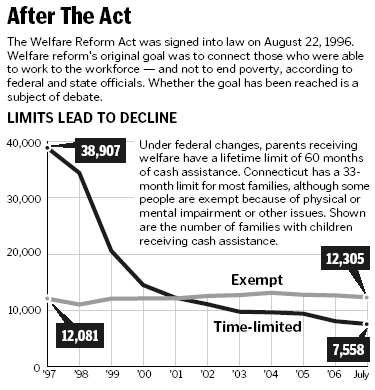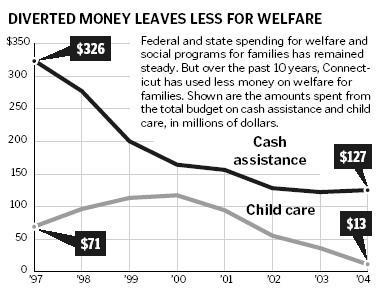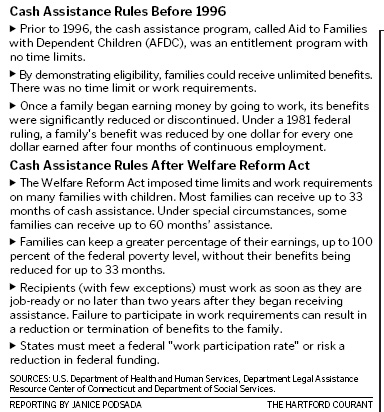 |
 |
|||
|
||||
| Web Sites, Documents and Articles >> Hartford Courant News Articles > | ||
|
Safety Net Full Of Holes Welfare Reform Lets Many Families Down August 22, 2006 Suzette Strickland, a former welfare mother herself, sees plenty of families stuck in poverty in her outreach job at End Hunger Connecticut! Inc. From her perch in a converted house on Hartford's Hungerford Street, it's clear to her that welfare reform - exactly 10 years in - has left behind the single mothers most deeply mired in the cycle of desperation.
Just last week, a 35-year-old grandmother came into Strickland's office to see about food stamps, with some of her extended family in tow. "She has a 21-year-old daughter with three children, plus custody of two grandchildren from another child," Strickland said. All seven were living in a small apartment, paying $900 a month cobbled together from the young grandmother's part-time job, her daughter's job at Wal-Mart, and some welfare money for the children she has in custody. The father of her daughter's three children just went off to prison, so he's no help. But with her daughter unable to keep working at Wal-Mart because she had a baby this summer, the family can't muster the rent. The grandmother long ago reached her maximum of 33 months on welfare. Her daughter is eligible for cash assistance through state-administered, federally subsidized welfare, but the daughter is moving - with her two older children and newborn - into a friend's one-bedroom apartment. That's a very good friend. As for the grandmother, Strickland said matter-of-factly, "She's on her way to a shelter with the grandchildren." Eventually, that is. Even in summer, the family shelters are full, as Strickland found out in a round of calls. As the nation's sweeping welfare reform legislation hits the 10-year mark - President Clinton signed it Aug. 22, 1996 - there are thousands of triumphs being heralded, single mothers who are now working and no longer "on state." But the wreckage of partial reform - and that is what we have here - is all the more evident a decade later as this inflexible system, lacking badly needed supports, combines with a stubbornly mean economy to leave countless families in hopeless poverty. Yes, of course, in some ways they have brought their woes on themselves. Strickland, who was on cash, medical and food assistance for a couple of years in the late '80s as a new, single mother, balances her nurturing side by admitting that. "Take some responsibility. You can't just keep having more children when you're getting cash assistance," said Strickland, 43. Spare the righteous e-mails. The fact is, welfare reform was a bright idea: Strictly limit the number of months families could receive public cash, let them stay on Medicaid but force them to find jobs. But it has worked only for some people. Connecticut, which launched its own version of welfare reform months before the federal reform, has tried to do it on the cheap. This state has done welfare with paltry job training, while cutting key child care programs, without a transportation plan to help people get to their jobs, without regular mental health assessments and without enough caseworkers to make intelligent decisions when families reached their time limits. A booming economy might have masked those ills, and to some extent it did, for a while, as poverty rates dropped and single-mother employment rates climbed between 1996 and 2001. Those were the years when tens of thousands of people who had clearly overstayed their time on the welfare rolls trudged off to work. Then all at once, the recession of 2001 hit, just as many of the least employable welfare clients headed out to the checkout counters. It would have come clear that halfway welfare reform wasn't cutting it, but we were obsessed with national security and a state budget crisis. And this alleged boom that President Bush keeps talking about? It's hardly doing its part to help. Family income at the middle of the pay scale, adjusted for inflation, has fallen in every year for which we have data. Child poverty has steadily risen, from 16.2 percent in 2000 to 17.8 percent in '04. Connecticut poverty rates mirror the national picture: not as high as the mid-'90s, but rising. And so we shouldn't be fooled by the declining welfare rolls in the nation's richest state. We "celebrate" 10 years of reform alongside another lost generation of the poor. They are not, to be sure, owed a comfortable life at taxpayers' expense, but they simply have not seen the supports that were sold along with reform as rungs in the ladder to a dole-free life. Examples of the ways the system has let people down are easy to see. Money from the federal government keeps flowing to Connecticut, but the state has seen fit to divert much of it for other uses. In 1997, the federal grant for Temporary Aid to Needy Families, combined with the state's match, totaled $454 million - of which $326 million went to direct cash assistance and $70.5 million went to child care, according to figures compiled by Jane McNichol at the Legal Assistance Resource Center. In 2004, the grant and state match totaled $462 million, but only $127 million was used for direct cash to families, and $13 million for child care. At least $184 million was diverted to other social spending, such as judicial intervention for children, as the state patched together budgets. Officially, the welfare system is flexible enough to grant extensions for families in which an adult cannot work because of barriers such as illiteracy and domestic violence. But, McNichol and others said, among more than 20,000 families receiving cash assistance last winter, only 150 had received extensions beyond the state's 33-month limit because of barriers to finding work or other reasons. That's just crazy, since the barriers are obviously there. Part of the problem is that caseworkers have so many clients. Speaking of crazy, another 10-year milestone passed quietly over the weekend. On Aug. 20, 1996, Clinton signed into a law a minimum-wage increase to $5.15 an hour as a companion to welfare reform. That was the last federal minimum wage hike, and although Connecticut's pay floor has risen to $7.40 an hour, the lack of a reasonable federal minimum has kept pay scales at the poverty level or lower for millions of single mothers. And the welfare benefit itself - for example, $543 a month for a family of three - has not increased since the late '80s. How are people getting by? Even people such as Strickland, on the front lines, don't know. The Connecticut General Assembly's program review panel is looking into the state's welfare system, and it ought to conclude that we need to know more about how families are faring - along with the obvious need to spend more money on support programs. There was a myth that people didn't want to work under the old welfare system, and another myth that the so-called private market for jobs could unwind poverty. Welfare reform has shown us that real barriers are what keep people from finding and holding jobs, and that the low-wage economy, which devalues work, will leave millions of families too far behind to ever see a decent life. Anyone who still thinks the social safety net is adequate, and that it's up to the poor to change their own luck, should call Strickland at End Hunger, and arrange to explain that to the newborn baby whose father sits in prison, whose mother will likely have to leave him in substandard care to return to Wal-Mart, whose grandmother awaits a spot at a homeless shelter.
|
||
| Last update:
September 25, 2012 |
|
||
|



